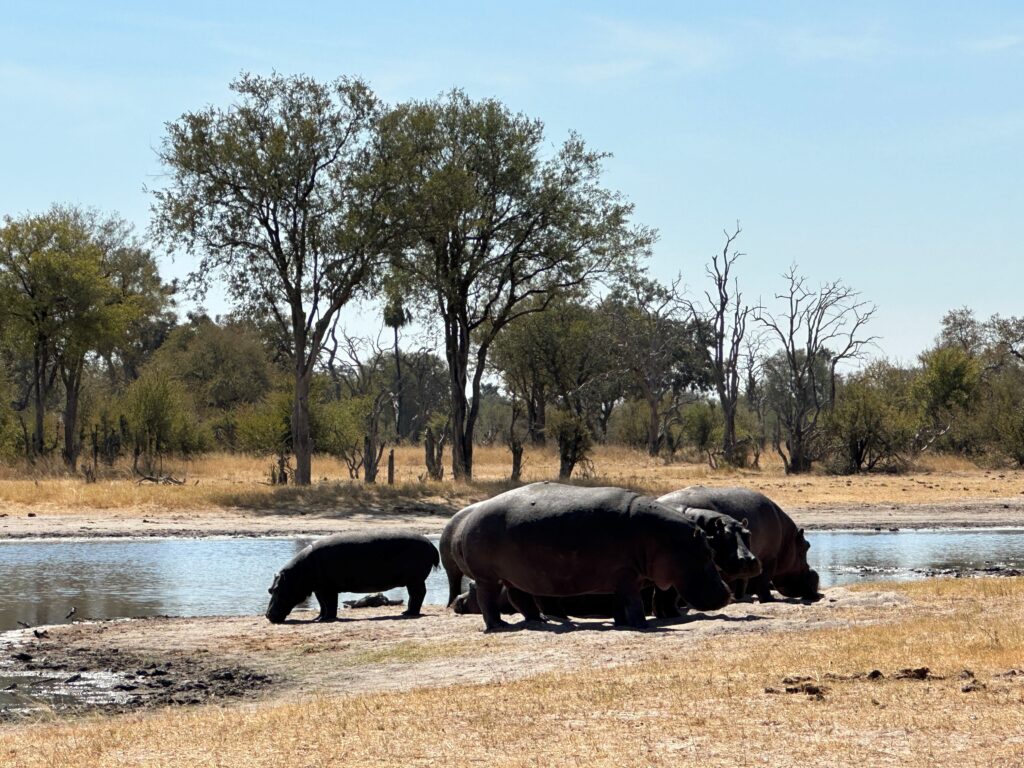Africa Travel and Sustainability: A familiar concept yet a difficult balance
October 17, 2023
I was just in Hwange National Park, Zimbabwe experiencing an Eco African Safari, where I saw first-hand how the word “sustainability” gets bounced around. Some people embrace it and what they think it means, while others revolt against it and its political implications. No matter which camp you’re in, it’s more complicated than you might think.

Take Hwange National Park, a popular location for Eco and Luxury African Safaris as an example. When there in July, traveling for work with other industry professionals but also with guests of my colleagues who have less exposure to the concepts as they apply to travel, the discussion got tense at times.
We were in Hwange specifically to see a rhino reintroduction program supported by Imvelo Camps (more on that in an upcoming article), but what we also saw was the Pump Run, a chain of pumped water holes for animal use, which they support. Here’s the Hwange water pump timeline, showing the dilemma:
- 1920’s: Artificial water support is initially begun in Hwange for human and animal success. Thousands of elephants learn the location of the bore holes, making them a relied upon source of much needed water on a long, hot migration to and from Botswana, Zambia, and other areas in the region. They pass this information from generation to generation as the migration continues.
- Early 2000’s: The Zimbabwean government allows the pumps to fall into disrepair because of political upheaval in the country and the de-prioritization of water and land health.
- 2005: The rains fail to produce adequate water and hundreds of elephants die because of the neglect of the pumps.
- The Conversation: The idea of sustainability, and how we accomplish it responsibly, evolves, and continues to evolve, through the years. Some believe that the pumps should not be started, that the fuel consumption to run them is an issue, in combination with the false support of herds that should balance to the naturally available resources.
- Water hole congestion is a primary concern: With little water available, the elephants dominate the few remaining water holes, making them unapproachable and unusable to other species. 2015 saw a huge loss of Cape buffalo in the area, with buffalo deaths numbering in the hundreds.
- A solution is needed: Realizing that the elephants won’t simply adapt without a detrimental impact to regional herd numbers, and that the government will not be a reliable support for the ongoing program, around 2015 the discussion about the pumps begins again, along with a conversation about how to get the pumps out of governmental control, giving their maintenance greater stability.
- Solutions: Over time, the 34 pumps are repaired, with many being switched from diesel to solar or wind power, with locals manning them to ensure that the pump mechanisms continue to operate. The water holes’ future is more secure, now in the hands of non-profit and tourism segments instead of being managed by the government.
Some on the trip felt that it was still an intrusion, that despite the support to the herds, that human intervention was inappropriate no matter the consequences, and that we need to leave the animals to figure out the new environment and let nature find a balance on its own. With less water, the immediate fallout would be the deaths of hundreds, maybe thousands of animals, but arguably the herd numbers would then reach a sustainable number naturally. Watching the melee at the bore holes is indeed a bit off-putting, and we all feared injury to the jostling animals. Should this be allowed?
Others believed that there is no way that animals aren’t impacted by human expansion. With National Park borders surrounded by villages also taking water from the ecosystem, and coal mines pushing the boundaries of Hwange National Park, the pump system is the least that we can do to help protect vital elephant and other herd populations from greater impact. Yes, there is chaos at the bore holes, but there is enough for all animals, elephants and others alike, under this system.
We all make our decisions about what we support when we travel, and what we don’t, but it’s important to understand that sustainability, like so many other words, can mean different things. When traveling in areas under pressure, I’d encourage any traveler to understand the consequence of human impact in the areas that you’re visiting. Ask questions and seek understanding from the locals and from fellow travelers, and further develop your own perception of what sustainability really means.
Call me and the Outdoor Travel Adventure team to see these challenges, and have these conversations, for yourself! You may agree with the decisions that you see made on these topics or you may not, but one thing is for sure… you’ll never see the world the same way again

 +1 800 554 9059
+1 800 554 9059